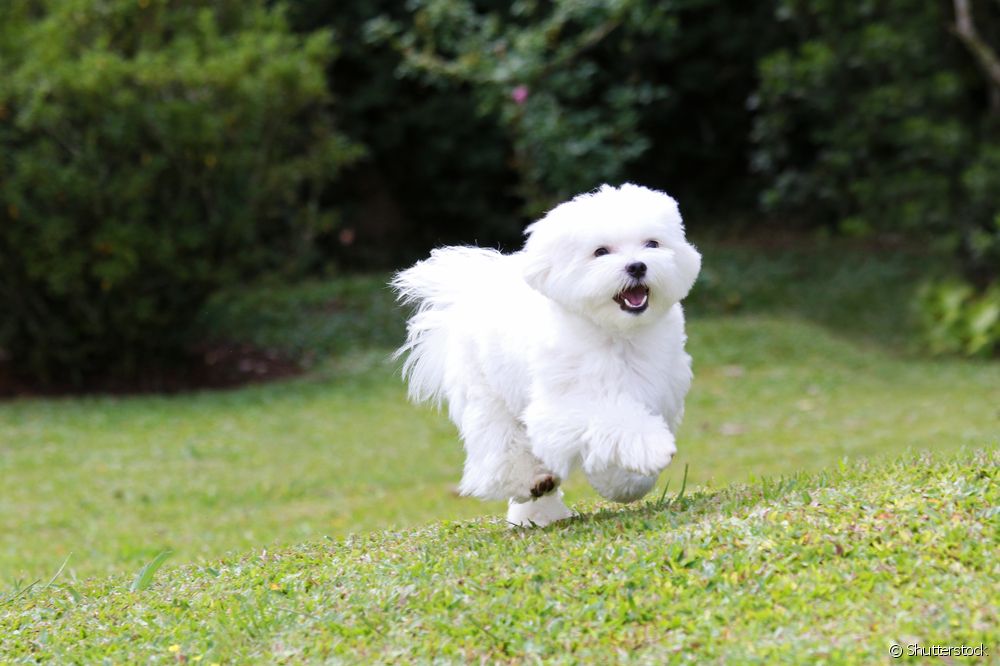Maltese: 10 characteristics of the small dog breed

Table of contents
The Maltese is one of the most successful small dogs. He is cheerful, fun and has the charisma needed to win a place in anyone's heart. Sometimes he can be a little stubborn, but nothing that good training can't solve. To learn a little more about the Maltese (personality, physical characteristics and some care), we have prepared a special article about this dog.furry. Check it out!
1) Maltese: dog is recognized mainly because of the white coat
The white fur of the Maltese is striking from afar. This is a breed that does not have different shades, so white is the only accepted and officially recognized color. What can happen is that some Maltese puppies have slightly darker tones around the paws and ears, but the rest of the body is always very white.
2) The hair of the Maltese breed needs special care
The Maltese's coat type is long and smooth - and leaving it always looking healthy and beautiful is not a simple task. Brushing is an essential care that must be done daily to untangle possible knots and remove the dead coat that accumulates on the dog's body. In addition, bathing and grooming are other ways to care for the coat of the Maltese dog breed, so it is important to take care of it.don't forget to schedule your dog's trip to the pet shop.
3) Maltese mini is a misused nomenclature
Some dog breeds can have different size variations, but this is not the case with the Maltese. In fact, people often refer to the smallest puppy in the litter as a "mini Maltese". All dogs of the breed follow a single size standard, so there is no reason to differentiate them with the terms mini or micro.
See_also: How to tell if your cat is male or female - see the infographic!4) Maltese: the dog's personality is gentle, fun and affectionate
The Maltese dog conquers everyone with his charisma. With a loving and lively way, this is a dog that always brings a lot of joy into the house. He likes to play, does not dispense caresses and loves to be the center of attention. He also gets attached very easily to his human family, and makes a point of accompanying humans all the time.
5) The Maltese dog breed is also quite fearless
Size definitely doesn't matter, and the Maltese dog breed is living proof of that. Despite being a very small dog, he is super brave and courageous. He will do anything to protect those he loves, and if he detects any threat, the Maltese will not hesitate to warn or defend you - even when it comes to a dog much bigger than him.
See_also: Fastest dog in the world: find out which breed holds the title of fastest dog
6) The Maltese tends to bark a lot
Because the Maltese is always on the alert, it may bark a lot when it feels threatened or wants to get its guardian's attention. The dog's barking is an important part of the species' communication, but if it becomes excessive, it can be circumvented with training or even environmental enrichment to keep it distracted for longer.
7) Maltese dog breed is super intelligent
If you opt for training, you won't regret it. The Maltese is a very intelligent breed that learns quickly what it is taught, so it won't be difficult to inhibit unwanted behaviors (such as barking). For training to be successful, the puppy needs to be trained by someone he loves and trusts, as the Maltese is usually more obedient with people with whom they have an emotional bond.
8) Maltese: dog can suffer from separation anxiety
Being a super attached dog, the Maltese doesn't like to be left alone at home for too long. In fact, it is very common for the breed to suffer from separation anxiety. When this happens, the dog cries whenever the guardian leaves the house and / or may start to have destructive attitudes. It is important not to encourage this problem further - and in more serious cases it is indicated to seek a doctor.behavioral veterinarian.
9) The socialization of the Maltese dog is fundamental for him to live well with everyone
Maltese dogs usually get along well with all kinds of people, including children (preferably older ones). The docile and calm temperament of the pet makes this type of interaction much easier, but it is still important to invest in the socialization of the Maltese as early as the puppy's first year of life (after vaccinations, of course). This greatly facilitates the process of meeting other dogs and peopleto avoid coexistence problems in the pet's adult life.
10) The Maltese dog is prone to develop some health problems
Heart disease and obesity are the most common problems in the Maltese dog breed. In the first case, it is important to observe any sign of excessive tiredness or difficulty breathing to seek specialized help. Canine obesity should be prevented mainly by practicing physical exercise and a balanced diet. Remember that just like any other puppy, the Maltese is a very healthy dog.Maltese also need daily walks to expend energy.

